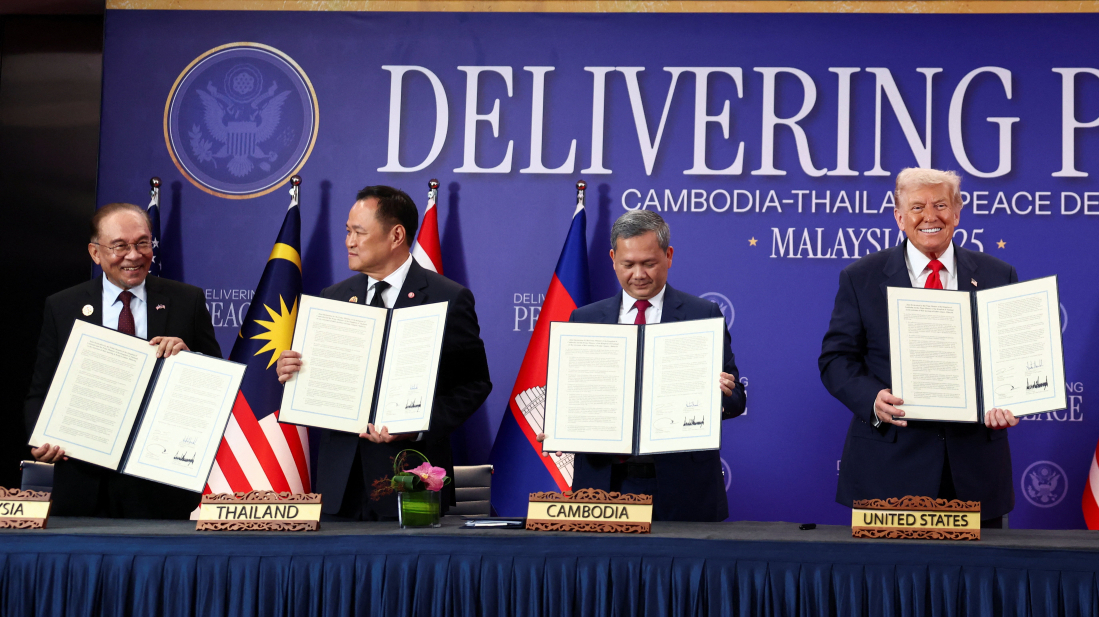Drug lord El Mencho death sparks nationwide violence, at least 62 dead in Mexico
At least 62 people have been killed in Mexico after a pre-dawn military raid targeting one of the country’s most wanted cartel leaders triggered coo...

The leaders of Thailand and Cambodia on Sunday signed an expanded ceasefire agreement under the watch of U.S. President Donald Trump, who arrived in Malaysia for the ASEAN Summit and a series of key trade discussions.
Thai Prime Minister Anutin Charnvirakul and his Cambodian counterpart Hun Manet inked the deal at a ceremony bearing the slogan “Delivering Peace”, building upon a truce reached three months earlier. Hun Manet described the declaration as a foundation for “lasting peace” and a chance to heal divisions caused by conflict, which has deeply affected border communities and civilians.
Trump previously brokered an end to the five-day conflict in July by personally phoning both leaders and warning that their trade negotiations with Washington could be frozen if hostilities continued. “The United States will enjoy strong commerce and cooperation with both nations as long as they live in peace,” Trump said.
The two sides accuse each other of triggering the deadly exchange of rockets and artillery that left at least 48 people dead and displaced about 300,000, the most severe fighting in years. Despite the recent death of Queen Mother Sirikit, Anutin attended the ceremony, pledging to withdraw heavy weapons from the border and announcing Thailand’s release of 18 detained Cambodian soldiers.
Trade and diplomacy
Upon landing in Malaysia, Trump was welcomed by Prime Minister Anwar Ibrahim and a troupe of traditional dancers at Kuala Lumpur International Airport. After briefly joining the dance and waving both U.S. and Malaysian flags, he travelled with Anwar to the city for meetings with regional leaders.
Meanwhile, U.S. and Chinese trade negotiators held talks on the summit’s sidelines to prevent further escalation of their ongoing trade dispute. U.S. Trade Representative Jamieson Greer said the discussions covered a broad agenda, including the possible extension of a truce on tariffs and expressed optimism for “a productive meeting between the leaders.”
Rare earth minerals, over which China maintains a dominant global supply, were at the centre of the talks as Washington seeks to diversify supply chains. Trump also announced that the U.S. would soon finalise critical minerals deals with Thailand and Malaysia, with a broader trade pact with Cambodia in progress.
Later on Sunday, Trump was expected to meet Brazilian President Luiz Inácio Lula da Silva to discuss U.S. tariffs. Lula called the 50% levies on Brazilian goods a “mistake”, citing America’s $410 billion trade surplus with Brazil over the past 15 years. Trump hinted before departing for Asia that he was open to revising the tariffs.
Talks with Canadian Prime Minister Mark Carney, however, were off the agenda after recent negotiations collapsed. Trump said on Saturday he would raise tariffs on Canada by another 10% “above what they’re paying now.”
East Timor joins ASEAN
In a historic move, East Timor, also known as Timor-Leste became ASEAN’s 11th member on Sunday, achieving a long-held goal first envisioned nearly fifty years ago while still under Portuguese rule.
The small nation of 1.4 million people remains one of Asia’s poorest, with an economy worth around $2 billion, a fraction of ASEAN’s collective $3.8 trillion GDP. Its accession, though largely symbolic, marks a diplomatic triumph for President José Ramos-Horta and Prime Minister Xanana Gusmão, both central figures in the country’s independence movement.
“For the people of Timor-Leste, this is not just a dream fulfilled but an affirmation of our journey,” Gusmão said. “Our accession stands as a testament to the spirit of our young democracy, born from struggle.”
Pakistan said it carried out cross-border strikes on militant targets inside Afghanistan after blaming a series of recent suicide bombings, including attacks during the holy month of Ramadan, on fighters it said were operating from Afghan territory.
Italy said a fond farewell to the Winter Olympics on Sunday with an open-air ceremony in the ancient Verona Arena that celebrated art and sporting achievement at a Games lauded as a model for how to stage such events.
The United States and Iran will hold a new round of nuclear negotiations in Geneva on Thursday as part of renewed diplomatic efforts to reach a potential agreement, Oman’s Foreign Minister Badr Albusaidi announced on Sunday.
Islamic State claimed two attacks on Syrian army personnel on Saturday (22 February), saying they marked the start of a new phase of operations against the country’s leadership under President Ahmed al-Sharaa.
Further Iran-U.S. nuclear talks are scheduled in Geneva on Thursday (26 February) as diplomacy resumes over Tehran’s nuclear programme following earlier mediation efforts. But will the talks move Iran-U.S. negotiations closer to a deal, and what should be expected from the meeting?
Chinese travellers made an estimated 362.58 million cross-regional passenger trips on Monday, the final day of the Spring Festival holiday, according to official data.
Thousands of people gathered across Europe and beyond over the weekend in solidarity with Ukraine, as the war with Russia entered its fifth year.
A powerful winter storm has brought large parts of the U.S. Northeast to a standstill, dumping more than a foot of snow across several states and severely disrupting transport and daily life.
The United Nations mission in Afghanistan said on Monday it had received “credible reports” that at least 13 civilians were killed and seven others injured in overnight Pakistani airstrikes inside Afghanistan.
Police in Britain said Peter Mandelson, the former U.K. ambassador to the United States, has been released on bail after being arrested as part of a misconduct in public office investigation linked to the Epstein files.
You can download the AnewZ application from Play Store and the App Store.

What is your opinion on this topic?
Leave the first comment